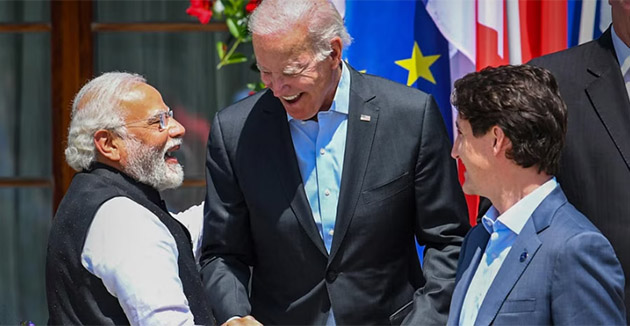
Canadian Prime Minister Justin Trudeau’s shocking allegations that India orchestrated the murder of a separatist leader leaves President Joe Biden caught between one of the US’s closest allies and an increasingly important partner in countering China.
Narendra Modi’s government on Tuesday denied that it had anything to do with the slaying of a prominent Sikh leader in Canada, calling the allegation “absurd.” Both nations expelled one of the other’s diplomats, and that’s before Canada has made any evidence public.
The White House reacted cautiously, with National Security Council spokesperson Adrienne Watson saying the administration was “deeply concerned” and called on India to cooperate with the Canadian investigation. A US official acknowledged the allegations pose a problem for Biden, who just left India with relations seemingly on track.
Now the episode threatens to upend the US’s effort to court India as a counterweight to China, which was on display at the Group of 20 summit in New Delhi earlier this month. The US and its allies had hailed Modi’s success in reaching a compromise on a joint communique, accepting softer language on Russia’s war in Ukraine to align itself more broadly with India in the battle with China for influence among major emerging economies.
“The Biden administration is in a no-win situation with this latest bombshell,” said Derek Grossman, a senior defense analyst at the RAND Corporation. “If it sides with Ottawa, then New Delhi will be up in arms and, once again, question the loyalty of Washington. If it sides with New Delhi, then the US is contradicting a NATO ally.”
The US frequently finds itself torn between its efforts to defend human rights around the world and the pragmatic need to partner with government accused of regular abuses to protect its geopolitical interests. That leads to periodic tensions, such as when agents from Saudi Arabia murdered Washington Post columnist Jamal Khashoggi in 2018.
Trudeau told lawmakers on Monday there were “credible allegations” that agents of the Indian government were behind the murder of Hardeep Singh Nijjar, a Canadian citizen, outside a Sikh temple in British Columbia in June. Nijjar, 45 at the time and the temple’s president, was outspoken in both his advocacy for the creation of an independent Khalistan in the northwest and his criticism of human rights violations in India.
“The government of India needs to take this matter with the utmost seriousness,” Trudeau said on Tuesday morning. Canada is going to “remain calm, we’re going to remain grounded in our democratic principles and values, and we’re going to follow the evidence and make sure that the work is done to hold people to account,” he added.
India has denied any involvement and blasted Canada for failing to take action against Sikh separatism. India had declared Nijjar a wanted terrorist and accused him of conspiring to murder a Hindu priest, among other allegations.
Without a resolution, the dispute threatens everything from pending talks to expand the modest $11 billion India-Canada trade relationship to communications between the two countries’ militaries, something that could create a headache for Biden as he seeks greater cohesion from partner nations.
Modi’s government sees Trudeau as politically beholden to the Sikh community, and expects relations with Canada to deteriorate, according to an Indian official with knowledge of the situation. At the same time, the person said, India-US security cooperation is on a strong footing and is unlikely to affected by Canada’s allegations.
“There is this evergreen challenge that the US and some of its allies face with India, concerns about what they regard as democratic backsliding,” said Michael Kugelman, director of the South Asia Institute at the Wilson Center. “But at the same time they want to ensure they don’t risk imperiling relations with a country that they view as strategically critical. Honestly, I think Washington will just stay quiet.”
The historical issue of Sikh separatism has troubled Canada-India relations for years, and politicians in both countries have tapped into the issue to win votes. Canada has the largest Sikh population outside of Punjab after many left following riots in 1984. They have also become an important political group, including within Trudeau’s administration. Modi’s party, meanwhile, has pushed policies appealing to voters who see India as a Hindu nation.
India has been historically prickly about public criticism from the US and its allies, and the US has said that it tries to voice concerns behind close doors. Speaking in Vietnam after his G-20 visit to India this month, Biden said he had raised rights issues in his recent meeting with Modi, though it’s unclear if they discussed Nijjar’s killing.
For its part, Canada pledged in a recently published strategy for the Indo-Pacific region to grow ties with India across a range of areas, while also acknowledging its growing strategic importance. The two sides had also previously expected to agree to a trade pact by end of this year but that was put on hold ahead of the G-20 summit. Canada last week postponed a trade mission to India that had been set for October.
As the India-Canada relationship worsens, the US will face a tough balancing act, according to Vivek Mishra, senior fellow at New Delhi based Observer Research Foundation.
“I expect there will certainly be back-channel discussion between the US and India on how to proceed further,” he said. “With Canada being a NATO ally and India being a strategic partner ally, the US will have to do the tightrope walk.”






Comments
Add new comment